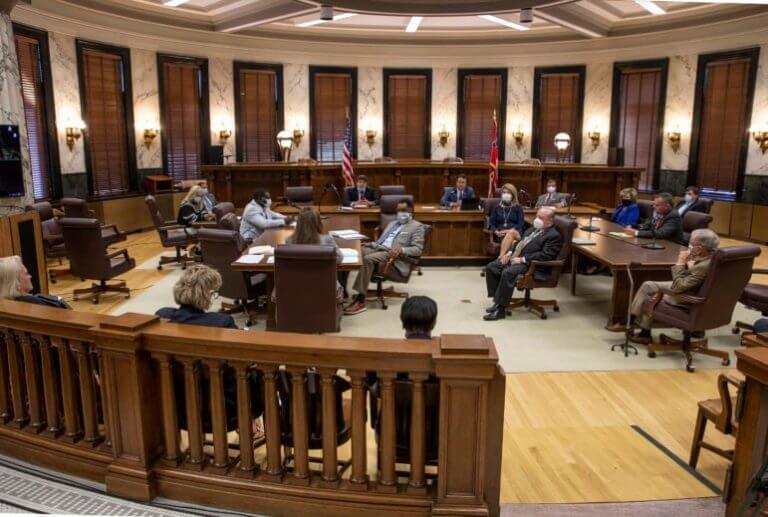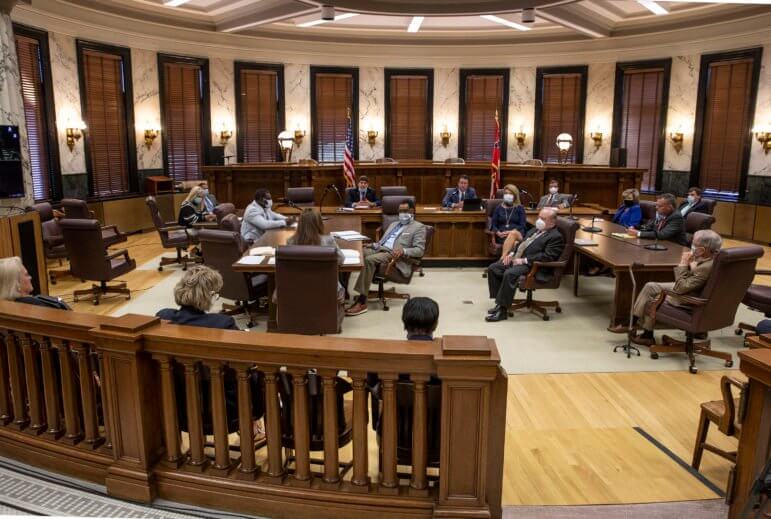

Eric J. Shelton/Mississippi Today
Lawmakers at the Capitol during the COVID-19 pandemic.
Despite unprecedented growth in revenue collections during the first two months of the current fiscal year, House Speaker Philip Gunn warned Thursday that legislative leaders should spend cautiously as they begin the lengthy process of developing a budget for the next one, which begins July 1.
Gunn made his remarks during a hearing of the Legislative Budget Committee where Corey Miller, an economic analyst for the state Institutions of Higher Learning, told the panel the state economy had been buoyed by funds Mississippians received from the federal Coronavirus Aid, Relief and Economic Security (CARES) Act.
“We attribute much of this performance to the federal transfers from the CARES Act, which included additional unemployment benefits, the Paycheck Protection Program, and the $1,200 taxpayer stimulus checks,” Miller told legislative leaders.
Gunn said, based on estimates he had seen, $6 billion in federal funds were pumped into the state to provide enhanced unemployment benefits, grants to small businesses through the PPP and direct payments of $1,200 to most Mississippi adults.
Based in large part on the CARES funds, state revenue collections during the first two months of the fiscal year increased almost 35%, or roughly $258 million. Still, Gunn said there is a likelihood state tax collections will slow considerably in the coming months, leaving legislators with tough choices to make in funding education, health care, law enforcement and other aspects of state government.
Earlier in the summer, the Legislature passed a budget for the current fiscal that was $84.5 million, or 1.3% less than what was appropriated the previous year. In that budget most agencies absorbed small cuts and many were hoping with the strong revenue collections this year they could recoup some of those losses.
Miller said the state lost 122,400 jobs in March and April as the COVID-19 pandemic exploded — 10.5% of the workforce. The drop in the national workforce was 14.5%, he said. The state has recouped 71% of those jobs, compared to 48% on the national level.
“The COVID-19 recession has hit service sectors the hardest, and service sectors make up a smaller share of Mississippi’s economy compared to the U.S. economy, both in terms of output and employment,” Miller said.
The size of Mississippi’s economy reduced 20.9% during the second quarter, compared 31.7% on the national level. While the economy has rebounded, Miller said both nationally and in the state the expectation is that there will be substantial contractions for the economy for the calendar year. Growth is expected to occur in 2021, though, and the state is projected to rebound to its current trend of lagging behind the national economy.
Lt. Gov. Delbert Hosemann asked how much the state was harmed by having one of the nation’s lowest work force participation rates, which references the number of people eligible to work compared to those actually working or pursuing work. Miller said the state’s work force participation rate was 55 percent before COVID-19 hit and most likely had dropped some.
“Our economy is not as productive as it would be if we had more people employed,” Miller said.
The budget committee also heard the budget requests of multiple agencies Thursday, including:
CORRECTIONS
The troubled Mississippi Department of Corrections is requesting an increase in its budget of nearly $33 million, to $365 million, for the coming year, to hire more officers and make other improvements in efforts to stave off action by the federal government that could force far more spending, new MDOC Commissioner Burl Cain told lawmakers.
“This department has been neglected so much by the people who ran it before that we are having to play catch-up,” Cain said.
Cain said he is also focusing on rehabilitation and re-entry programs, but wants to go beyond just education and skills training for inmates, and provide religious programs as he did when he led the Louisiana prisons system.
“If you don’t so something about the heart — teach morality — then you’ve just created a smarter criminal,” Cain said. “It takes religion. That’s where you find morality quicker than anything else. I don’t care what religion it is.”
PUBLIC SAFETY
The Department of Public Safety is asking for a budget of $97 million, a $5.7 million from the current year.
New Public Safety Commissioner Sean Tindell said the department has been making improvements to its embattled driver’s licenses services that will reduce long waits and lines. He said the agency also continues planning for a new headquarters campus in Rankin County, and hopes to start construction on the $70 million facility in 2021 and complete it in 2024. Tindell said he hopes to train and hire more Mississippi Highway Patrol troopers and more Mississippi Bureau of Narcotics agents to combat the opioid problem, which he said has been exacerbated by the COVID-19 pandemic.
MEDICAID
The federal-state health program that serves 760,000 Mississippians is asking for $898 million in state funds for the coming year, a decrease of $496,000 from the current year, Medicaid Director Drew Snyder told lawmakers. He said the agency might even carry forward a balance.
But Snyder said the future is uncertain with the COVID-19 pandemic and “the Medicaid budget is always fluid and at this point it’s even more so.”
Snyder said states have been seeing “enhanced federal match” money and that early in the pandemic there was a dramatic decrease in utilization by Medicaid recipients when people were sheltering in place. The federal share of Medicaid spending during the pandemic, Snyder said, increased from nearly 77% to 83%, reducing the state’s share of costs.
K-12 PUBLIC EDUCATION
The Mississippi Department of Education is asking lawmakers for a budget of $2.86 billion for the coming year, an $311 million increase from the current year.
The bulk of the requested increase —$283 million — would be to fully fund the Mississippi Adequate Education Program — a formula set in law by the Legislature to fund schools which lawmakers have fully funded only twice over 30 years.
Superintendent of Education Carey Wright told lawmakers the system is dealing with challenges during the COVID-19 pandemic including maintaining statewide distance learning and handling a massive project to buy 390,000 computers and tablet devices for students and teachers.
“This is giving us a time to think differently about it and be innovative,” Wright said. “But you’re never going to replace a teacher.”
The post Legislators anticipate revenue slowdown as they begin budgeting process appeared first on Mississippi Today.
- UMMC clinic closures extend to Friday amid cyberattack recovery - February 25, 2026
- Regency Hospital in Meridian to close by mid-March - February 25, 2026
- Advocates call for funding, collaboration as more Mississippians are expected to struggle with food insecurity - February 25, 2026